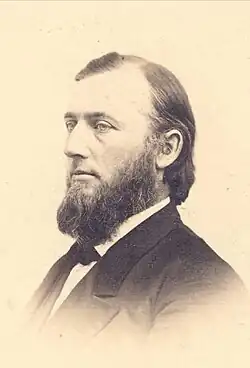Frederick Starr (reverend)
Frederick Starr | |
|---|---|
 | |
| Born | January 23, 1826 |
| Died | January 8, 1867 |
| Alma mater | |
| Occupation | |
Frederick Starr (January 23, 1826 – January 8, 1867) was an American clergyman and abolitionist.
About
Starr, was the second son of Frederick and Sarah Starr, and was born in Rochester, New York, January 23, 1826.[1] He had united, at the age of ten, with the First Presbyterian Church in Rochester.
He graduated from Yale College in 1846. He turned to preparation for the ministry immediately upon leaving college. After three years in the Auburn Theological Seminary, in 1850 he visited Missouri, laboring for a few weeks in St. Louis as a city missionary, and for some months with the Presbyterian Church in Weston. Toward the end of the same year he was ordained pastor of this church. His location, on the western border of the state, four miles from Fort Leavenworth, exposed him to the agitation concerning the repeal of the Missouri Compromise, and the Kansas Border War. Finally, after varied persecution, his declared conviction that slavery was morally wrong obliged him to leave the town in the Spring of 1855 to avoid violence.[2]
He spent the next seven years in Western New York, as agent of the Western Education Society, and of Auburn Theological Seminary. Resigning the former of these positions in April, 1862, he took charge of the Presbyterian church in Penn Yan, New York, over which he was installed June 12. From April, 1865, until his death, he was pastor of the North Presbyterian Church in St. Louis.[3] Mr. Starr was the author of a pamphlet, published anonymously, in 1853, entitled Letters for the People, on the Present Crisis, (52 pages, 8vo.)[1] which contained nine letters written from St. Louis, and discussing the influence of slavery upon the opening of Nebraska Territory and the building of the Pacific Railroad. This pamphlet had, it is believed, a wide influence. He also published a sermon on President Lincoln's death.
He died in St. Louis, Missouri, of a fever, induced by overwork, January 8, 1867, aged 41 years.
He was married, in 1850, to Helen Mills, daughter of Prof. Henry Mills, D. D., of Auburn. He and Helen had three children, including the anthropologist Frederick Starr.[4][5]
His papers are held at the State Historical Society of Missouri. [2]
References
- ^ a b "Starr, Frederick". McClintock and Strong Biblical Cyclopedia. Retrieved 16 July 2025.
- ^ a b "Frederick Starr, Jr. Papers (C2073)" (PDF). State Historical Society of Missouri. Retrieved July 22, 2025.
- ^ "Starr, Frederick". Missouri Historical Society. Retrieved July 22, 2025.
- ^ Boettcher, Kaitlyn (6 February 2013). "Frederick Starr: Anthropologist Lost from the History Books". Retrieved 22 July 2025.
- ^ Parezo, Nancy J.; Fowler, Don D. (July 31, 2007). "Taking Ethnological Training Outside the Classroom: the 1904 Louisiana Exposition as Field School". Google Books. 'Histories of Anthropology Annual,' Vol. 2, University of Nebraska Press, ISBN 978-0-8032-6663-6. Retrieved July 22, 2025.
![]() This article incorporates public domain material from the Yale Obituary Record.
This article incorporates public domain material from the Yale Obituary Record.
External links
- Bierbaum, Milton E. (1964). "Frederick Starr: A Missouri Border Abolitionist: The Making of a Martyr". Missouri Historical Review. 58 (3).
- Library of Congress website, “Image 1 of What shall be done with the people of color in the United States? A discourse delivered in the First Presbyterian Church of Penn Yan, New York, November 2d, 1862’ , speech by Rev Frederick Starr
- Frederick Starr at Find a Grave